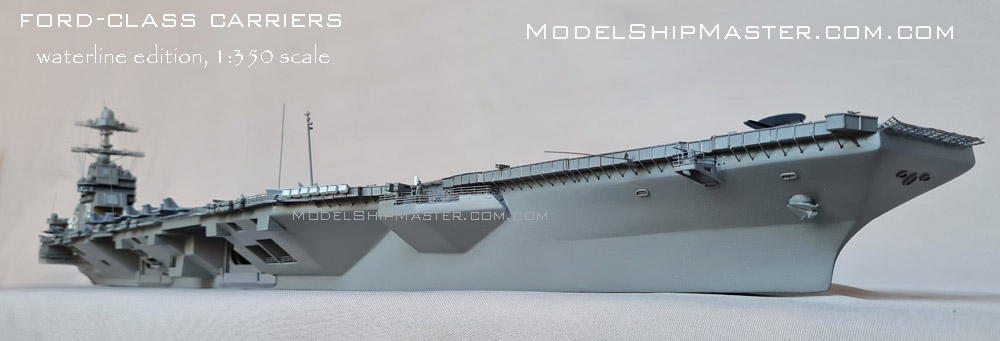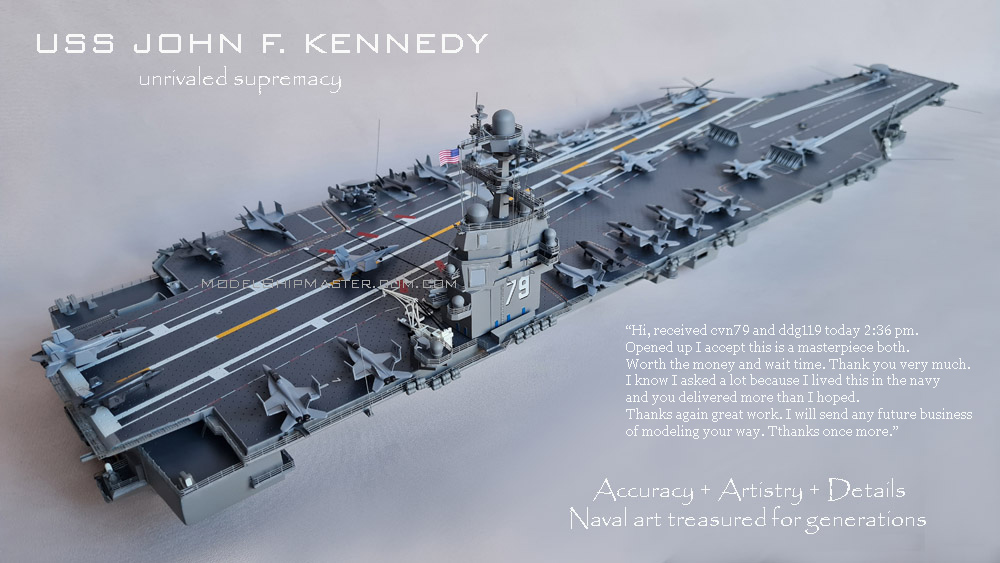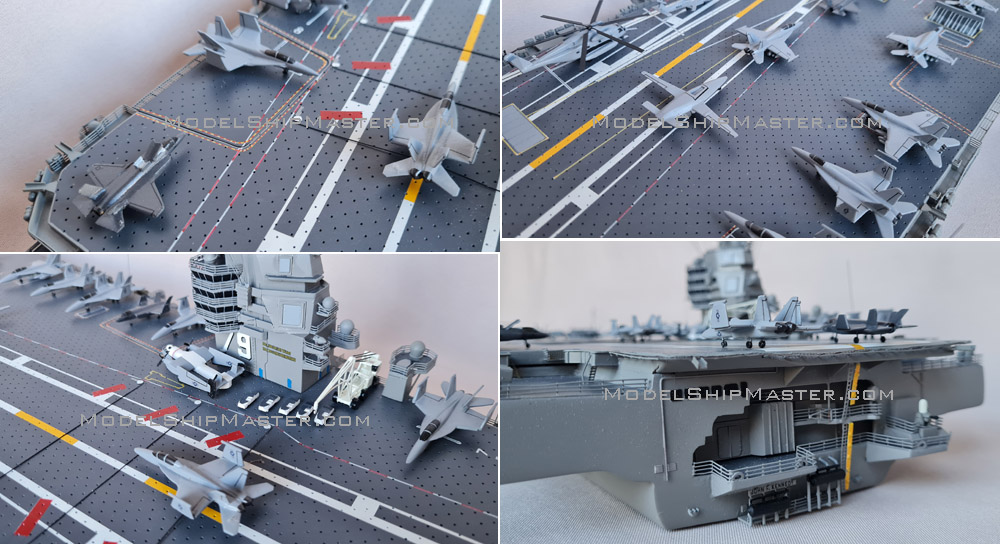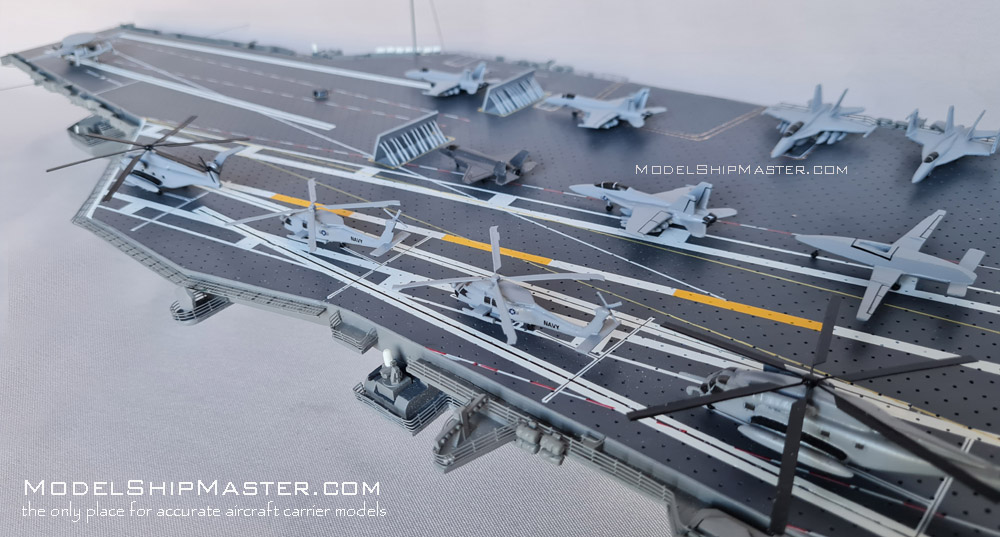|


256-bit encryption
$500,000 protection

|
USS JOHN F. KENNEDY
CVN-79
aircraft
carrier model
USS John F. Kennedy
aircraft carrier is the second Gerald R. Ford-class built for the United States Navy.

John F. Kennedy's keel was laid
in Newport News, Virginia on 22 August 2015. As part of
the traditional keel laying ceremony, the initials of
ship sponsor Caroline Kennedy, daughter of President
Kennedy and the sponsor of the previous John F. Kennedy,
were welded into the ship's hull. The ship was
christened on 7 December 2019 by Caroline Kennedy, who
reenacted the bottle bash she did when the first John F.
Kennedy (CV-67) was christened 52 years earlier.
The ship began testing her Electromagnetic Aircraft Launch System
in 2022, and her combat system in 2023. She is scheduled
to be delivered in 2025.

The USS John F. Kennedy
aircraft carrier can carry
up to 90 aircrafts - 30 more than Nimitz class. She can
sustain 160 sorties per day for 30-plus days, with a
surge capability of 270 sorties per day. Underneath the
massive steel deck, the ship features 40 refueling
stations and a revised configuration for her weapons
elevators. She could achieve about 30 percent greater
sortie generation rates than her predecessors.
 |
Carrier radars play an essential role in detecting
threats. The Nimitz class requires half a dozen
different radars to accomplish all the necessary
functions, from detection to tracking to target
identification. The USS John F. Kennedy's design replaces
this collection of sensors with a single multifunction
radar that takes up much less space. The system is much
more sensitive than previous air-defense radars and easy
to maintain (no moving parts). Because it requires less
space, the island becomes smaller, reducing the
carrier’s own radar signature.
The smaller, redesigned island is further aft than those
of older aircraft carriers. This change creates deck space for a
centralized rearming and refueling location, and thereby
reduces the number of times that an aircraft will have
to be moved after landing before it can be relaunched. Fewer aircraft movements require, in
turn, fewer deck hands to accomplish them, reducing the size of the ship's crew
and increasing sortie rate.
A Nimitz-class
carrier needs a remarkable 5,000 sailors (including
airwing staff) to operate. 1,100
fewer personnel required to operate the USS
John F. Kennedy –
a 20 percent reduction from the
Nimitz.
|
CVN-79 has very good air
conditioning in the bridge. This not only makes the crew
more productive but also reduces maintenance
requirements because of lower level of humidity. CVN-79 is
projected to enter drydock only once every 12 years.
John F. Kennedy aircraft
carrier's twin nuclear reactors are almost three
times more powerful than the ones onboard the
Nimitz-class—generating 250 percent more electricity.
The
increased generating capacity is needed to support
futuristic ship defenses like high-power lasers.
The ship produces 400,000 gallons of fresh
water daily.

John F. Kennedy carrier will cost $4 billion
less to operate across its 50-year lifetime than a
Nimitz-class carrier. That is a great bargain for a
warship that is far superior to what came before in
virtually every performance metric.

The waterline model was
first commissioned by an ex navy whose knowledge about
the JFK aircraft carrier was extensive. We can sure
build the ship
full hull. Please let us know of your interest. Our
email is
services@modelshipmaster.com or
modelshipmaster@hotmail.com
We at ModelShipMaster.com
scratch
build the most accurate and beautiful warship models
in the history of model business. Our knowledge
prowess, meticulosity, ingenuity, artistry, and a
relentless drive for perfection leave no places for
rivalry.
If you are interested to learn more, please click here:
warship model.
Learn more about the
USS John F. Kennedy
aircraft carrier
here:
https://en.wikipedia.org/wiki/USS_John_F._Kennedy_(CVN-79) |